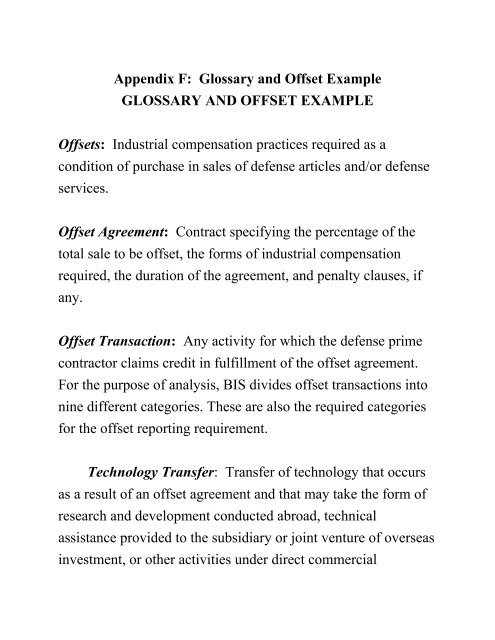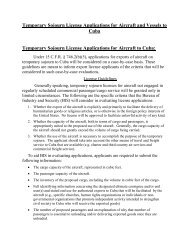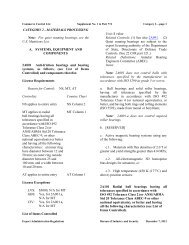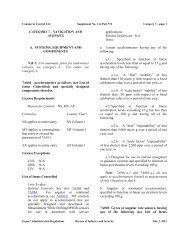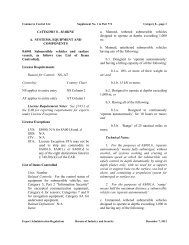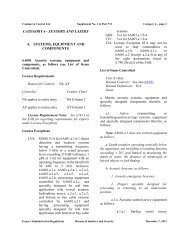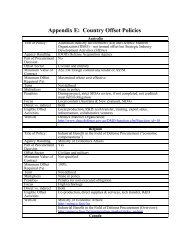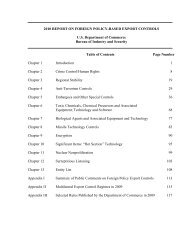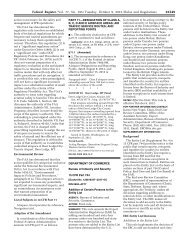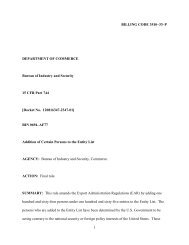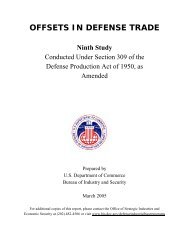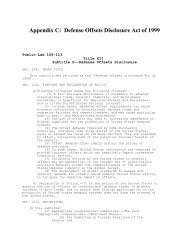Offset Fulfiller - Bureau of Industry and Security
Offset Fulfiller - Bureau of Industry and Security
Offset Fulfiller - Bureau of Industry and Security
Create successful ePaper yourself
Turn your PDF publications into a flip-book with our unique Google optimized e-Paper software.
Appendix F: Glossary <strong>and</strong> <strong>Offset</strong> Example<br />
GLOSSARY AND OFFSET EXAMPLE<br />
<strong>Offset</strong>s: Industrial compensation practices required as a<br />
condition <strong>of</strong> purchase in sales <strong>of</strong> defense articles <strong>and</strong>/or defense<br />
services.<br />
<strong>Offset</strong> Agreement: Contract specifying the percentage <strong>of</strong> the<br />
total sale to be <strong>of</strong>fset, the forms <strong>of</strong> industrial compensation<br />
required, the duration <strong>of</strong> the agreement, <strong>and</strong> penalty clauses, if<br />
any.<br />
<strong>Offset</strong> Transaction: Any activity for which the defense prime<br />
contractor claims credit in fulfillment <strong>of</strong> the <strong>of</strong>fset agreement.<br />
For the purpose <strong>of</strong> analysis, BIS divides <strong>of</strong>fset transactions into<br />
nine different categories. These are also the required categories<br />
for the <strong>of</strong>fset reporting requirement.<br />
Technology Transfer: Transfer <strong>of</strong> technology that occurs<br />
as a result <strong>of</strong> an <strong>of</strong>fset agreement <strong>and</strong> that may take the form <strong>of</strong><br />
research <strong>and</strong> development conducted abroad, technical<br />
assistance provided to the subsidiary or joint venture <strong>of</strong> overseas<br />
investment, or other activities under direct commercial
arrangement between the defense prime contractor <strong>and</strong> a foreign<br />
entity.<br />
Subcontractor Production: Overseas production <strong>of</strong> a part or<br />
component <strong>of</strong> a U.S.-origin defense article. The subcontract<br />
does not necessarily involve license <strong>of</strong> technical information <strong>and</strong><br />
is usually a direct commercial arrangement between the defense<br />
prime contractor <strong>and</strong> a foreign producer.<br />
Co-production: Overseas production based upon<br />
government-to-government agreement that permits a foreign<br />
government or producer(s) to acquire the technical information<br />
to manufacture all or part <strong>of</strong> a U.S. origin defense article. Coproduction<br />
includes government-to-government licensed<br />
production, but excludes licensed production based upon direct<br />
commercial arrangements by U.S. manufacturers.<br />
Licensed Production: Overseas production <strong>of</strong> a U.S.-origin<br />
defense article based upon transfer <strong>of</strong> technical information<br />
under direct commercial arrangements between a U.S.<br />
manufacturer <strong>and</strong> a foreign government or producer.<br />
Purchases: Procurement <strong>of</strong> <strong>of</strong>f-the-shelf items from the
<strong>of</strong>fset recipient. Often, but not always, purchases are indirect by<br />
nature. Indirect purchases are similar in definition to<br />
countertrade, while direct purchases are analogous to buy-backs.<br />
Training: Generally includes training related to the<br />
production or maintenance <strong>of</strong> the exported defense item.<br />
Training may be required in unrelated areas, such as computer<br />
training, foreign language skills, or engineering capabilities.<br />
Investment: Investment arising from the <strong>of</strong>fset agreement,<br />
taking the form <strong>of</strong> capital invested to establish or exp<strong>and</strong> a<br />
subsidiary or joint venture in the foreign country.<br />
Marketing: Marketing assistance to foreign companies in<br />
either defense or unrelated industries. In some cases, countries<br />
require marketing in addition to the <strong>of</strong>fsets. Also encompasses<br />
export assistance.<br />
Other: Any other form <strong>of</strong> <strong>of</strong>fset required or <strong>of</strong>fered by a<br />
defense company/foreign government.<br />
<strong>Offset</strong> Recipients: Foreign firms that receive the benefits <strong>of</strong><br />
<strong>of</strong>fset transactions from defense firms. For example, a U.S.
company sells a defense item to a foreign country, with an <strong>of</strong>fset<br />
obligation requiring that components worth 50 percent <strong>of</strong> the<br />
export contract be built in the foreign country. The foreign<br />
companies manufacturing these components would be the<br />
“<strong>of</strong>fset recipients.”<br />
<strong>Offset</strong> <strong>Fulfiller</strong>: The company that provides the <strong>of</strong>fset<br />
compensation, which is usually the defense firm who signed the<br />
<strong>of</strong>fset agreement. However, there are times when the obligation<br />
is not related to the defense firm’s specialty <strong>and</strong> therefore is<br />
contracted out. For example, if marketing is a component <strong>of</strong> the<br />
<strong>of</strong>fset requirement, the defense firm may hire a marketing<br />
company to satisfy the obligation. The marketing firm would<br />
then be the “<strong>of</strong>fset fulfiller.”<br />
Actual Value <strong>of</strong> <strong>Offset</strong> Transactions: The market value <strong>of</strong> the<br />
<strong>of</strong>fset transaction measured in U.S. dollars.<br />
Credit Value <strong>of</strong> <strong>Offset</strong> Transactions: The value credited for the<br />
<strong>of</strong>fset transaction by application <strong>of</strong> a multiplier or other method.<br />
The credit value may be greater than or equal to the actual value<br />
<strong>of</strong> the <strong>of</strong>fset.
Multiplier: A factor applied to the actual value <strong>of</strong> certain <strong>of</strong>fset<br />
transactions to calculate the credit value earned. Foreign<br />
governments use multipliers to provide firms with incentives to<br />
<strong>of</strong>fer <strong>of</strong>fsets in targeted areas <strong>of</strong> economic growth. When a<br />
multiplier is applied to the <strong>of</strong>f-the-shelf price <strong>of</strong> a more desirable<br />
service or product <strong>of</strong>fered as an <strong>of</strong>fset, the defense firm receives<br />
a higher credit value toward fulfilling an <strong>of</strong>fset obligation.<br />
Example: A foreign government interested in a<br />
specific technology may <strong>of</strong>fer a multiplier <strong>of</strong><br />
“six” for <strong>of</strong>fset transactions providing access to<br />
that technology. A U.S. defense company with<br />
a 120 percent <strong>of</strong>fset obligation from a $1 million<br />
sale <strong>of</strong> defense systems ordinarily would be<br />
required to provide technology transfer through<br />
an <strong>of</strong>fset equaling $1.2 million. With a<br />
multiplier <strong>of</strong> six, however, the U.S. company<br />
could <strong>of</strong>fer only $200,000 (actual value) in<br />
technology transfer <strong>and</strong> earn $1.2 million in<br />
credit value, fulfilling its entire <strong>of</strong>fset obligation<br />
under the agreement.<br />
Direct <strong>Offset</strong>s: <strong>Offset</strong> transactions that are directly related to
the defense items or services exported by the defense firm.<br />
These are usually in the form <strong>of</strong> co-production, subcontracting,<br />
training, production, licensed production, or possibly technology<br />
transfer or financing activities.<br />
Indirect <strong>Offset</strong>s: <strong>Offset</strong> transactions that are not directly related<br />
to the defense items or services exported by the defense firm.<br />
The kinds <strong>of</strong> <strong>of</strong>fsets that are considered “indirect” include<br />
purchases, investment, training, financing activities,<br />
marketing/exporting assistance, <strong>and</strong> technology transfer.<br />
Penalties: Measures used to motivate defense firms to fulfill<br />
their <strong>of</strong>fset obligation within the timeframe allotted by the<br />
contract.<br />
Liquidated damages: If a firm fails to fulfill all required<br />
<strong>of</strong>fsets by the stipulated deadline, it must pay a percentage<br />
(usually 5-20 percent) <strong>of</strong> the total value <strong>of</strong> the export contract.<br />
The percentage for liquidated damages is specified in the<br />
contract.<br />
Non-performance penalties: Firms must pay a<br />
prearranged percent (2-10 percent) <strong>of</strong> all obligations not fulfilled
within the allotted time.<br />
Best efforts clauses: With a “best efforts” clause, there is<br />
no penalty for non-fulfillment <strong>of</strong> the contract; the firm is judged<br />
to be acting in good faith to meet its obligations. However,<br />
firms’ reputations can be jeopardized if <strong>of</strong>fset obligations are not<br />
fulfilled as stated in the contract; non-fulfillment would likely<br />
result in the U.S. defense firm being excluded from future<br />
procurements by that purchasing government.<br />
OFFSET EXAMPLE<br />
This example is for illustrative purposes only <strong>and</strong> in no way<br />
represents an actual <strong>of</strong>fset agreement. The fictitious nation <strong>of</strong><br />
Atlantis purchased ten KS-340 jet fighters from a U.S. defense<br />
firm, PJD Inc. (PJD), for a total <strong>of</strong> $500 million with 100<br />
percent <strong>of</strong>fset. In other words, the <strong>of</strong>fset agreement obligated<br />
PJD to fulfill <strong>of</strong>fsets equal to the value <strong>of</strong> the contract, or $500<br />
million. The government <strong>of</strong> Atlantis decided what would be<br />
required <strong>of</strong> PJD in order to fulfill its <strong>of</strong>fset obligation, which<br />
would include both direct <strong>and</strong> indirect compensation. The<br />
government also assigned the credit value for each category.
Direct <strong>Offset</strong>s (i.e., related to the production <strong>of</strong> the export item,<br />
the KS-340 jet fighter)<br />
Technology Transfer: The technology transfer requirement was<br />
assigned 36 percent <strong>of</strong> the total <strong>of</strong>fset obligation. PJD agreed to<br />
transfer all the necessary technology <strong>and</strong> know-how to Atlantis<br />
firms in order to repair <strong>and</strong> maintain the jet fighters. The<br />
Atlantis government deemed this capability to be vital to<br />
national security <strong>and</strong>, therefore, gave a multiplier <strong>of</strong> six. As a<br />
result, the transfer <strong>of</strong> technology actually worth $30 million was<br />
given a credit value <strong>of</strong> $180 million.<br />
Co-production: Atlantis firms manufactured some components<br />
<strong>of</strong> the KS-340 jet fighters, totaling $220 million, which<br />
accounted for 44 percent <strong>of</strong> the <strong>of</strong>fset obligation.<br />
Indirect <strong>Offset</strong>s (i.e., not related to the production <strong>of</strong> the export<br />
item, the KS-340 jet fighter)<br />
Purchase: PJD purchased marble statues from Atlantis<br />
manufacturers for eventual resale. These purchases accounted<br />
for 7 percent <strong>of</strong> the <strong>of</strong>fset obligation, or $35 million.
Financing Activities: PJD made investments in non-defense<br />
related industries in Atlantis; this accounted for 4 percent <strong>of</strong> the<br />
<strong>of</strong>fset obligation, or $20 million.<br />
Technology Transfer: PJD provided submarine technology to<br />
Atlantis firms, which accounted for 6 percent <strong>of</strong> the <strong>of</strong>fset<br />
obligation, or $30 million.<br />
Marketing: Commercial assistance was provided for Atlantis<br />
fisheries to market their fish in the United States, which fulfilled<br />
the remaining 3 percent, or $15 million <strong>of</strong> the <strong>of</strong>fset obligation.<br />
In this example, the Atlantis fisheries are <strong>of</strong>fset recipients<br />
because they received marketing services for their product. PJD<br />
hired an American advertising firm, the <strong>of</strong>fset fulfiller, to market<br />
the Atlantis fish.<br />
The duration <strong>of</strong> the <strong>of</strong>fset agreement was 10 years with a threeyear<br />
grace period. A timetable was created by the Atlantis<br />
government outlining which obligations should be fulfilled, to<br />
what extent, <strong>and</strong> when. If PJD did not meet the deadlines given,<br />
the company was required to pay the Atlantis government 5<br />
percent <strong>of</strong> the unfulfilled <strong>of</strong>fset amount in liquidated damages.<br />
For example, if after 10 years, only 98.5 percent <strong>of</strong> the <strong>of</strong>fset
obligation <strong>of</strong> $500 million was fulfilled, PJD would be required<br />
to pay liquidated damages in the amount <strong>of</strong> 5 percent <strong>of</strong> the 1.5<br />
percent unfulfilled portion <strong>of</strong> the <strong>of</strong>fset obligation, or $375,000.


